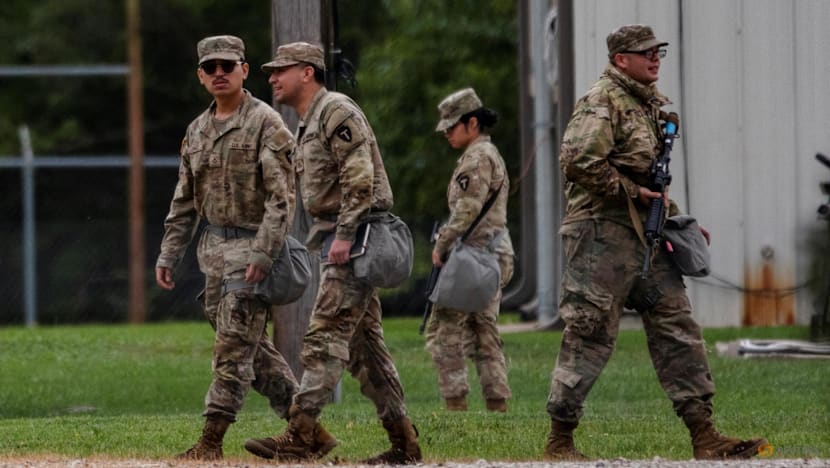Trump calls for jailing Democratic leaders as troops prepare for Chicago deployment
Trump's government has targeted Democratic-run cities around the nation for raids on migrants, often conducted by masked, plainclothes agents.

Texas National Guard troops walk through the Joliet Army Reserve Training Center, after US President Donald Trump ordered increased federal law enforcement presence to assist in crime prevention, in Elwood, Illinois, US, on Oct 7, 2025. (Photo: Reuters/Jim Vondruska)
WASHINGTON: United States President Donald Trump on Wednesday (Oct 8) called for jailing Chicago's mayor and the governor of Illinois, both Democrats, as his administration prepared to deploy military troops to the streets of the third-largest US city.
"Chicago Mayor should be in jail for failing to protect Ice Officers! Governor Pritzker also!" Trump posted on his social media platform.
The Republican was referring to Democratic leaders in Illinois who oppose his order for Immigration and Customs Enforcement (ICE) agents to conduct aggressive raids in Chicago.
Chicago mayor Brandon Johnson had announced "ICE-free zones" where city-owned property will be declared off-limits to the federal authorities.
Illinois Governor JB Pritzker, one of Trump's most fiery critics, called for prosecutors to investigate the legality of ICE activities in Chicago.
Trump's government has targeted Democratic-run cities around the nation for raids on migrants, often conducted by masked, plainclothes agents.
The crackdown fulfils a key promise made by Trump in his election victory last year, where he described the US as under attack by waves of foreign "criminals".
NATIONAL GUARD DEPLOYMENT
The US president had also authorised over the weekend the deployment of 700 National Guard troops to Chicago, sparking a lawsuit by Illinois state officials who accused him of using US troops "to punish his political enemies".
Two hundred Texas National Guard troops have arrived in Illinois, a Pentagon official said on Tuesday.
The deployment comes after Trump sent troops onto the streets of Los Angeles and Washington, and ordered them to Memphis and Portland, threatening to invoke emergency powers to forward such efforts if the courts get in the way.
In Memphis, police chief Cerelyn Davis told a city council meeting on Tuesday that she expected the National Guard deployment soon.
"It looks like maybe Oct 10 - in a few days we'll see the first group of individuals come to our city," Davis said, adding that some commanders were already there to prepare for their arrival.
Trump - who suggested last week that American cities be used as "training grounds" for US military forces - exaggerated the scale of unrest in Los Angeles and crime in Washington to justify those deployments, and a judge suggested he did the same with Portland.
The troops from Texas were sent to Illinois as part of a mission to protect "federal functions, personnel, and property", the Pentagon official said on condition of anonymity, adding that the Guardsmen had been mobilised for an initial period of 60 days.
The troops were seen on Tuesday at a military facility in Elwood, southwest of Chicago.
The planned deployment of those forces has infuriated Pritzker, who said they "should stay the hell out of Illinois", and that any deployment against his state government's wishes would amount to an "invasion".
Related:
"UNTETHERED TO THE FACTS"
"The American people, regardless of where they reside, should not live under the threat of occupation by the US military, particularly not simply because their city or state leadership has fallen out of a president's favour," the Illinois Attorney General and counsel for Chicago said.
However, Judge April Perry, an appointee of Trump's Democratic predecessor Joe Biden, declined to issue an immediate temporary restraining order, instead scheduling a full hearing for Thursday.
Homeland Security Secretary Kristi Noem has defended the plan to send troops to Chicago, claiming that the third-largest US city is "a war zone".
Trump has similarly taken aim at Portland, which, like Chicago, has seen surges of federal agents as part of the president's mass deportation drive, prompting protests outside immigration processing facilities.
Trump asserted that it is "war-ravaged" and riddled with violent crime.
But in a Saturday court order temporarily blocking the deployment of troops to Oregon, US District Judge Karin Immergut wrote that "the president's determination was simply untethered to the facts".
Protests in Portland did not pose a "danger of rebellion" and "regular law enforcement forces" could handle such incidents, Immergut wrote.
Trump responded to that setback by openly mulling the use of the Insurrection Act - which allows the president to deploy the military within the US to suppress rebellion - in order to send more troops into Democratic-led US cities.
"We have an Insurrection Act for a reason," Trump said, adding that he would use it if "people were being killed and courts were holding us up or governors or mayors were holding us up".













